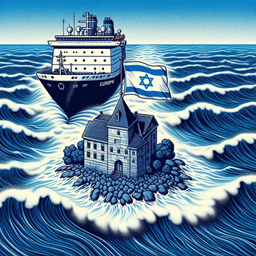by Ron Raskin

There are many perspectives on any political topic, most of which are subjective and influenced by personal feelings or interests. Consider the trolley problem, a well-known series of thought experiments in ethics that explore dilemmas such as whether to sacrifice one person to save a larger number. Now imagine you must choose between saving your neighbor’s child or someone from a distant state you might not even locate on a map. Wouldn’t your feelings and interests influence your decision?
Europe, which was the center of the world just a century ago with 28% of the global population, now accounts for less than 10% and is likely facing its greatest threat since WWII. It is in desperate search for solutions to its declining power and influence. The political left believes that successful integration of immigrants is the answer, while the right argues that alternative solutions are needed, as they believe immigrant integration is failing. This struggle is compounded by other challenges arising from its waning power, including threats from China, Russia, and other global players.
In this game of the century, the Western world desperately needs Saudi Arabia and other oil-rich, friendly Arab nations. Returning to the trolley problem: given the choice—assuming for a moment that it’s a straightforward decision, even though reality is more complex—between supporting Israel or ensuring the success of Muslim integration in Europe and securing an alliance with Saudi Arabia, what would be the expected choice of European countries?
Of course, this is not how the problem is publicly described or presented in the mass media. Unfortunately, while the mass media in democracies is free, it is not always independent. Often, the media represents the voices of interest groups, which push their narratives to the public in a simple and emotional manner. Not all these groups share the same opinions or views, but it seems that many have already made their choice. A significant number, particularly those in the left and center of the political spectrum, prioritize immigrant integration and alliances with Saudi Arabia over supporting Israel.
This doesn’t mean that the decision can’t change or that it’s a black-and-white choice. Saudi Arabia and other Sunni countries need military support to protect themselves. In a world where U.S. military forces are no longer large and strong enough to handle everything on their own, unlike 20-30 years ago, they need local allies, and Israel is a strong candidate for this role. Additionally, Israel’s technological potential is important for the Western coalition.
At the same time, Israel should recognize that its interest is to help the Western world wherever possible. While such support comes at a price (consider Ukraine) and should be approached with caution, the main idea is that any relationship should be reciprocal. If Israel wants to gain Western sympathy, it must be more attentive to the challenges in Europe.
The world is searching for its path to the future, leading to many disagreements about the best way forward. This includes tensions between Israel and the rest of the Western world. However, despite differing approaches, there is no real debate about who the good and bad guys are—all Western countries agree on where Iran and its proxies stand.

